All this alerts us to the fact that each text and each usage in the text has no absolute existence, content, or meaning, but is always understood in relation to where we are now, what we regularly read and expect to see on the page. The translator frequently finds himself obliged to translate not the words themselves, but the distance between those words and other words that might normally have been used, but weren’t. It is a tough proposition.
Unless . . . unless we come to the conclusion that it no longer makes sense, or very soon may not make sense, to talk about different territories and rules and being “one of us.” Very soon it may be that we are all, at least as far as literature is concerned, part of one global territory where we are obliged to be constantly aware of different customs not as if they were happening far away within fairly well-marked and self-contained boundaries, but as if they had become part of what happens on our street. In that case, we may, for a while, as international stylistic conventions slowly form, be obliged to accept that we live in an era of great confusion, where the exact position any writer is taking in relation to a presumed cultural standard has grown extremely problematic.
There is a fascinating moment in the history of translation that occurs sometime in the early twentieth century when, with some notable exceptions, translators stop translating the names of characters. It is as if Italian readers had become so aware of England that one could no longer go on talking of Niccolò Nickleby, Samuele Pickwick, and their famous author Carlo Dickens. Or you could say that the Christian name no longer suggests a parental choice and social reference that we can easily transfer into our own system of names, but rather an absolute unchangeable denotation of an individual. Charles Dickens is Charles Dickens throughout the universe.
In any event, this global mingling of cultures works against nuance and in favor of the loud, clamorous, highly stylized, and idiosyncratic voice that can stand out in the cosmopolitan crowd. It will be a world in which the need for an editor to mediate and clarify the position of the individual writer in relation to some hypothetical standard will be seriously challenged, but, in the general disorientation, all the more necessary. Indeed, it may well be that as the Internet era matures and more authors self-publish online without any editorial assistance, we will begin to grow nostalgic for those finicky copy editors who at least gave us something well-defined to kick against.
“WE MUST BELIEVE in poetry translation, if we want to believe in World Literature.” Thus Tomas Tranströmer, the Swedish poet and winner of the 2011 Nobel Prize in Literature, quoted in a recent essay by Robin Robertson, one of his translators. Robertson goes on to describe the difficulties of capturing Tranströmer’s spare voice and masterful evocation of Swedish landscape in English, particularly if you don’t know Swedish well. Robert Lowell, Robertson tells us, translated Tranströmer with only a “passing knowledge” of the language. Robertson himself describes a process wherein his Swedish girlfriend gives him a literal line-by-line translation into English, then reads the Swedish to him to give him “the cadences,” after which he creates “relatively free” versions in English.
This approach to translation is not uncommon among poets (W.H. Auden gave us his versions of Icelandic sagas in much the same way). Nevertheless, Robertson feels the need to call on various authorities to sanction a translation process that assumes that poetry is made up of a literal semantic sense, which can easily be transmitted separately from the verse, and a tone, or music, which only a poet is sufficiently sensitive to reconstruct. Thus Robertson observes:
In his introduction to Imitations (1962), Robert Lowell writes that “Boris Pasternak has said that the usual reliable translator gets the literal meaning but misses the tone, and that in poetry tone is of course everything.”
Here the “of course” skates over the fact that tone is always in relation to content: if the content were altered while diction and register remained the same, the tone would inevitably shift. One notes in passing the disparagement of the “usual reliable translator”—the fellow knows his foreign language, but doesn’t understand poetry.
T.S. Eliot is then cited as having warned Lowell not to present his “imitations” of Tranströmer and others as “translations”:
If you use the word translation in the subtitle it will attract all those meticulous little critics who delight in finding what seem to them mis-translations. You will remember all the fuss about Ezra Pound’s Propertius.
Here collocating meticulous with little does the job that Lowell/Pasternak achieved with “usual reliable”: there are always people who interfere but don’t understand.
Robertson also calls on the British poet Jamie McKendrick, who, he feels, is “surely right” when he says “The translator’s knowledge of language is more important than their knowledge of languages.” How vague this remark is! Does it mean that the translator has one kind of knowledge of how language in general achieves its effects, and another of the nuts and bolts of the different languages he knows, the first kind being “more important” than the second? If that is the case, then to what degree more important? Wouldn’t the two, rather, be interdependent and mutually sustaining? These perplexities apart, the thrust of McKendrick’s argument is clear enough: we are sweeping aside the objection that a profound knowledge of a foreign language might be required to translate its poetry, or prose for that matter, thus clearing the path for a translation by someone who is an expert in the area that counts: our own language.
I really do not wish to nitpick. I enjoy Lowell’s and Robertson’s translations of Tranströmer, and Pound’s Propertius. I am glad these people did the work they did, giving us many fine poems along the way. As a writer myself who has also done a number of translations I might be expected to have a vested interest in the idea that what skill I have in English sets me apart from the “usual reliable” translator. However, and quite regardless of whether we want to call such work translation or imitation, it does seem that a serious issue is being dispatched with indecent haste here.
Let us remember our most intense experiences of poetry in our mother tongue, reading Eliot and Pound as adolescents perhaps, Frost and Wallace Stevens, Auden and Geoffrey Hill, then coming back to them after many years, discovering how much more was there than we had imagined, picking up echoes of other literature we have read since, seeing how the poet shifted the sense of this or that word slightly, and how this alters the tone and feeling of the whole. And then let’s also recall some of the finest poetry criticism we have read—by William Empson, Christopher Ricks, or Eliot himself—the ability of these men to fill in linguistic and literary contexts in such a way that the text takes on a deeper meaning, or to tease out relations inside a poem that had been obscure, but once mentioned are suddenly obvious and enrich our experience of the work.
Now imagine that, having a poet friend who wishes to translate these authors, you offer a literal translation of their poems in your second language, perhaps French, perhaps German, perhaps Spanish. Maybe you read The Four Quartets out loud, line by line, to give him the cadence. But does our translator friend, who doesn’t know our language well, hear what we hear when we read aloud? The onomatopoeia, perhaps. But a dying fall in one tongue may not be the same in another, not to mention the echoes of other texts, or simply of voices in the air in our language. During my thirty years in Italy I have often been told by uninitiated English friends what a beautiful and harmonious language Italian is; but that is Italian as heard by an ear accustomed to English sound patterns. To the Italian ear, and to mine these days, much of what is said in Italian grates. One hears the language differently when one knows it.
Читать дальше












